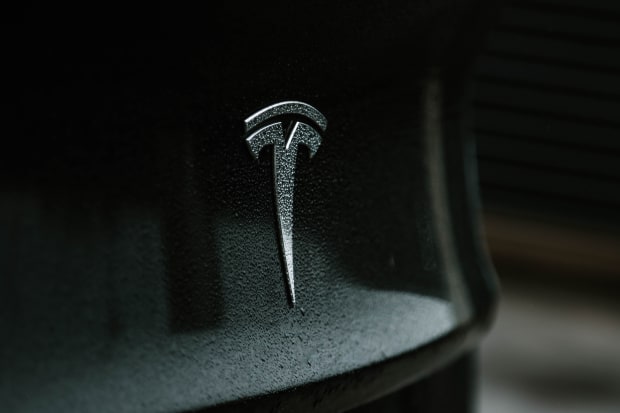An article to be found here: https://www.thestreet.com/crypto/.amp/bitcoin/tesla-stock-token-binance

Tesla stock tokens will be available on cryptocurrency exchange Binance when the Nasdaq opens Monday – but not for everyone.
Investors in the U.S., mainland China and Turkey will not be able to own the stock tokens, which allow traders to buy and sell fractions of underlying shares, a notable if not groundbreaking effort that would lower the bar for entry into high-priced stocks for traders.
The Tesla (TSLA) tokens will be priced and settled in Binance USD (BUSD), a stablecoin pegged to the U.S. dollar and issued by New York-based Paxos Trust Company.
“Stock tokens demonstrate how we can democratize value transfer more seamlessly, reduce friction and costs to accessibility, without compromising on compliance or security,” Binance CEO Changpeng Zhao said in a press release. “Through connecting traditional and crypto markets, we are building another technological bridge for a more inclusive financial future.”
The Malta-based company partnered with German investment firm CM-Equity AG and Swiss-based Digital Assets AG to offer the tokens.
The Binance stock tokens are fully backed and will behave in many of the same ways as the shares they represent. Token holders qualify for returns and Binance will automatically pass on dividends or issue tokens representing any new shares following a split.
Although the crypto community often touts that its markets are always open, the Tesla stock tokens will only be available when the Nasdaq is open.
There’s one other drawback. Token holders aren’t granted the same rights as shareholders, like voting power, inspecting corporate documents or suing for wrongful acts.
The stock tokens can be sold in fractions as small as 1/100th the original share. That means investors with only $70 to invest could add Tesla (TSLA) to their portfolio with a token worth 1/10th a single share.
It’s worth pointing out that fractional shares isn’t revelatory.
Fidelity and Charles Schwab allow investors to buy fractions of ETFs, stocks listed on NYSE and Nasdaq or those included in the S&P 500 index. Robinhood, the online brokerage that earlier this year found itself caught in a Reddit-fueled rally for GameStop, AMC and other stocks that had been heavily shorted by hedge funds, also supports the trading of fractional shares.
As for buying stocks with crypto, that’s not yet been done in a way that complies with U.S. securities laws.
In 2012, 1broker starting allowing users to trade stocks and gold with Bitcoin. Then in 2018 the SEC and CFTC sued, alleging the firm sold securities to U.S.-based investors who didn’t meet discretionary investment thresholds and had failed to register itself as a dealer.
A nearly identical series of events played out in early 2019 when Abra, founded by former Goldman Sachs software engineer and Netscape director Bill Barhydt, started allowing users to buy ETFs and fractions of stocks with Bitcoin.
By the summer of 2020, the SEC and CFTC sent a cease and desist letter arguing Abra had not properly registered investors buying the securities-based swaps and failed to transact them on a registered national exchange.
Both companies wound up paying fines to settle the lawsuits. 1broker shut down as a result, but Abra still operates its crypto exchange and wallet services.
Binance has already had a near-miss with U.S. regulators, but not for its tokenized stocks.
In November, Binance sent emails giving U.S. investors two weeks to withdraw their funds in anticipation regulators would act. To create an airlock between Binance and U.S. regulators, the company set up Binance.US.
It offers access to fewer cryptocurrencies, charges higher fees and its daily volumes of $89 million are dwarfed by Binance’s $8.2 billion, according to a piece published by Decrypt in November. Binance.US is also unavailable for investors in Connecticut, Hawaii, Idaho, Louisiana, New York, Texas and Vermont according to an update posted to its blog at the start of the year.
Binance has not yet said whether it or Binance.US will seek to make stock tokens available to U.S.-based investors.
